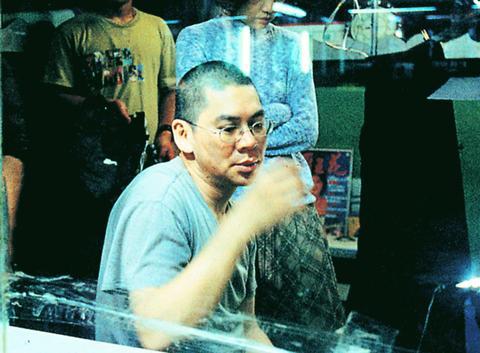Tsai Ming-liang (
Prior to the film's departure for Venice, Homegreen Films, Tsai's own production company, has decided to open a one-week screening in Taipei from today until next Thursday, with screening each day at 7pm at Galaxy Cinema. The film will be officially released in Taiwan at the end of the year.
Goodbye, Dragon Inn makes use of many of Tsai's favorite actors such as Lee Kang-sheng (

PHOTO COURTESY OF HOMEGREEN FILMS
The story of Goodbye, Dragon Inn take place in an old movie theater, a few hours before it is destined to close for good. On this very last day the theater plays a martial arts classic, King Hu's (
Two old men appear at the theater, shocking the Japanese man, for they are Miao Tien and Shih Chun (
Tsai, with his dark sense of humor, pays tribute to the old movie theaters that were part of his childhood days. "When I heard that the Fuho Theater [in Taipei] was to close, I had an impulse to shoot a film about it. Now I look back, it was actually the theater calling to me, saying `come and film me!'" Tsai said. The theater makes an appearance in Tsai's What Time is It There?
London-based film critic and scholar Tony Ryans describes the film as "what may be Tsai's most brilliant metaphor yet." "A lament for the death of feelings framed as a valediction to an entire era of Chinese cinema and an obituary to film-going in general.
Goodbye, Dragon Inn will be Tsai's second entry in the Venice Film Festival. The last time Tsai joined the event was with his second film Vive L'Amour (

Most heroes are remembered for the battles they fought. Taiwan’s Black Bat Squadron is remembered for flying into Chinese airspace 838 times between 1953 and 1967, and for the 148 men whose sacrifice bought the intelligence that kept Taiwan secure. Two-thirds of the squadron died carrying out missions most people wouldn’t learn about for another 40 years. The squadron lost 15 aircraft and 148 crew members over those 14 years, making it the deadliest unit in Taiwan’s military history by casualty rate. They flew at night, often at low altitudes, straight into some of the most heavily defended airspace in Asia.

Many people in Taiwan first learned about universal basic income (UBI) — the idea that the government should provide regular, no-strings-attached payments to each citizen — in 2019. While seeking the Democratic nomination for the 2020 US presidential election, Andrew Yang, a politician of Taiwanese descent, said that, if elected, he’d institute a UBI of US$1,000 per month to “get the economic boot off of people’s throats, allowing them to lift their heads up, breathe, and get excited for the future.” His campaign petered out, but the concept of UBI hasn’t gone away. Throughout the industrialized world, there are fears that

Taiwan’s democracy is at risk. Be very alarmed. This is not a drill. The current constitutional crisis progressed slowly, then suddenly. Political tensions, partisan hostility and emotions are all running high right when cool heads and calm negotiation are most needed. Oxford defines brinkmanship as: “The art or practice of pursuing a dangerous policy to the limits of safety before stopping, especially in politics.” It says the term comes from a quote from a 1956 Cold War interview with then-American Secretary of State John Foster Dulles, when he said: ‘The ability to get to the verge without getting into the war is

Like much in the world today, theater has experienced major disruptions over the six years since COVID-19. The pandemic, the war in Ukraine and social media have created a new normal of geopolitical and information uncertainty, and the performing arts are not immune to these effects. “Ten years ago people wanted to come to the theater to engage with important issues, but now the Internet allows them to engage with those issues powerfully and immediately,” said Faith Tan, programming director of the Esplanade in Singapore, speaking last week in Japan. “One reaction to unpredictability has been a renewed emphasis on